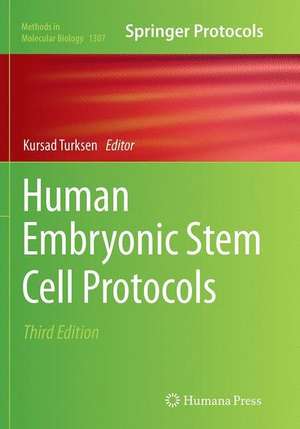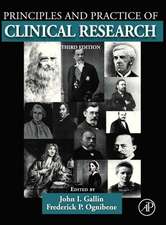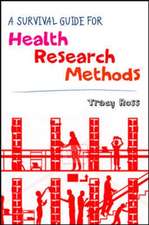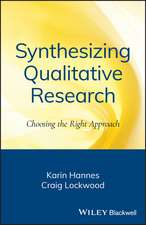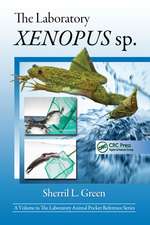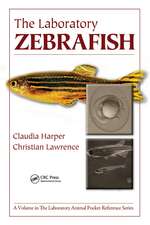Human Embryonic Stem Cell Protocols: Methods in Molecular Biology, cartea 1307
Editat de Kursad Turksenen Limba Engleză Paperback – 25 oct 2016
Thorough and practical, Human Embryonic Stem Cell Protocols, Third Edition serves as a valuable resource to all those interested in exploring stem cell biology questions in a research setting.
| Toate formatele și edițiile | Preț | Express |
|---|---|---|
| Paperback (2) | 592.85 lei 38-44 zile | |
| Springer – 25 oct 2016 | 592.85 lei 38-44 zile | |
| Humana Press Inc. – 23 aug 2016 | 802.67 lei 38-44 zile | |
| Hardback (2) | 601.78 lei 38-44 zile | |
| Humana Press Inc. – 2 noi 2009 | 671.14 lei 22-36 zile | |
| Springer – 11 aug 2015 | 601.78 lei 38-44 zile |
Din seria Methods in Molecular Biology
- 9%
 Preț: 791.63 lei
Preț: 791.63 lei - 23%
 Preț: 598.58 lei
Preț: 598.58 lei - 20%
 Preț: 882.98 lei
Preț: 882.98 lei -
 Preț: 252.05 lei
Preț: 252.05 lei - 5%
 Preț: 802.70 lei
Preț: 802.70 lei - 5%
 Preț: 729.61 lei
Preț: 729.61 lei - 5%
 Preț: 731.43 lei
Preț: 731.43 lei - 5%
 Preț: 741.30 lei
Preț: 741.30 lei - 5%
 Preț: 747.16 lei
Preț: 747.16 lei - 15%
 Preț: 663.45 lei
Preț: 663.45 lei - 18%
 Preț: 1025.34 lei
Preț: 1025.34 lei - 5%
 Preț: 734.57 lei
Preț: 734.57 lei - 18%
 Preț: 914.20 lei
Preț: 914.20 lei - 15%
 Preț: 664.61 lei
Preț: 664.61 lei - 15%
 Preț: 654.12 lei
Preț: 654.12 lei - 18%
 Preț: 1414.74 lei
Preț: 1414.74 lei - 5%
 Preț: 742.60 lei
Preț: 742.60 lei - 20%
 Preț: 821.65 lei
Preț: 821.65 lei - 18%
 Preț: 972.30 lei
Preț: 972.30 lei - 15%
 Preț: 660.49 lei
Preț: 660.49 lei - 5%
 Preț: 738.41 lei
Preț: 738.41 lei - 18%
 Preț: 984.92 lei
Preț: 984.92 lei - 5%
 Preț: 733.29 lei
Preț: 733.29 lei -
 Preț: 392.60 lei
Preț: 392.60 lei - 5%
 Preț: 746.26 lei
Preț: 746.26 lei - 18%
 Preț: 962.66 lei
Preț: 962.66 lei - 23%
 Preț: 860.22 lei
Preț: 860.22 lei - 15%
 Preț: 652.64 lei
Preț: 652.64 lei - 5%
 Preț: 1055.50 lei
Preț: 1055.50 lei - 23%
 Preț: 883.87 lei
Preț: 883.87 lei - 19%
 Preț: 491.89 lei
Preț: 491.89 lei - 5%
 Preț: 1038.86 lei
Preț: 1038.86 lei - 5%
 Preț: 524.16 lei
Preț: 524.16 lei - 18%
 Preț: 2122.34 lei
Preț: 2122.34 lei - 5%
 Preț: 1299.23 lei
Preț: 1299.23 lei - 5%
 Preț: 1339.12 lei
Preț: 1339.12 lei - 18%
 Preț: 1390.26 lei
Preț: 1390.26 lei - 18%
 Preț: 1395.63 lei
Preț: 1395.63 lei - 18%
 Preț: 1129.65 lei
Preț: 1129.65 lei - 18%
 Preț: 1408.26 lei
Preț: 1408.26 lei - 18%
 Preț: 1124.92 lei
Preț: 1124.92 lei - 18%
 Preț: 966.27 lei
Preț: 966.27 lei - 5%
 Preț: 1299.99 lei
Preț: 1299.99 lei - 5%
 Preț: 1108.51 lei
Preț: 1108.51 lei - 5%
 Preț: 983.76 lei
Preț: 983.76 lei - 5%
 Preț: 728.16 lei
Preț: 728.16 lei - 18%
 Preț: 1118.62 lei
Preț: 1118.62 lei - 18%
 Preț: 955.25 lei
Preț: 955.25 lei - 5%
 Preț: 1035.62 lei
Preț: 1035.62 lei - 18%
 Preț: 1400.35 lei
Preț: 1400.35 lei
Preț: 592.85 lei
Preț vechi: 769.93 lei
-23% Nou
Puncte Express: 889
Preț estimativ în valută:
113.48€ • 123.30$ • 95.38£
113.48€ • 123.30$ • 95.38£
Carte tipărită la comandă
Livrare economică 16-22 aprilie
Preluare comenzi: 021 569.72.76
Specificații
ISBN-13: 9781493949984
ISBN-10: 1493949985
Pagini: 399
Ilustrații: XIV, 399 p. 68 illus., 40 illus. in color.
Dimensiuni: 178 x 254 mm
Ediția:Softcover reprint of the original 3rd ed. 2015
Editura: Springer
Colecția Humana
Seria Methods in Molecular Biology
Locul publicării:New York, NY, United States
ISBN-10: 1493949985
Pagini: 399
Ilustrații: XIV, 399 p. 68 illus., 40 illus. in color.
Dimensiuni: 178 x 254 mm
Ediția:Softcover reprint of the original 3rd ed. 2015
Editura: Springer
Colecția Humana
Seria Methods in Molecular Biology
Locul publicării:New York, NY, United States
Cuprins
Derivation of Human Embryonic Stem Cell Lines from Vitrified Human Blastocysts.- Characterizing Pluripotent Stem Cells Using the TaqMan® hPSC ScorecardTM Panel.- Growth of Human Pluripotent Stem Cells Using Functional Human Extracellular Matrix.- Efficient Expansion of Dissociated Human Pluripotent Stem Cells Using a Synthetic Substrate.- Microarray Approach to Identify the Signaling Network Responsible for Self-Renewal of Human Embryonic Stem Cells.- Monitoring Stemness in Long-Term hESC Cultures by Real-Time PCR.- Study of Gap Junctions in Human Embryonic Stem Cells.- Immunofluorescence Microscopy and mRNA Analysis of Human Embryonic Stem Cells (hESCs) Grown Under Feeder-Free Conditions.- Analysis of Intracellular Calcium Signaling in Human Embryonic Stem Cells.- Genetic Manipulation of Human Embryonic Stem Cells.- Genetic Modification in Human Pluripotent Stem Cells by Homologous Recombination and CRISPR/Cas9 System.- Use of Multicolor Flow Cytometry for Isolation of Specific Cell Populations Deriving from Differentiated Human Embryonic Stem Cells.- Definitive Endoderm Differentiation of Human Embryonic Stem Cells Combined with Selective Elimination of Undifferentiated Cells by Methionine Deprivation.- Derivation of Endothelial Cells and Pericytes from Human Pluripotent Stem Cells.- Differentiation of Human Embryonic Stem Cells on Periodontal Ligament Fibroblasts.- Derivation of Epithelial Cells from Human Embryonic Stem Cells as an In Vitro Model of Vocal Mucosa.- Human Embryonic and Hepatic Stem Cell Differentiation Visualized in Two and Three Dimensions Based on Serial Sections.- Derivation of Chondrogenic Cells from Human Embryonic Stem Cells for Cartilage Tissue Engineering.- Microgrooved Surface Modulates Neuron Differentiation in Human Embryonic Stem Cells.- Directed Differentiation of HumanEmbryonic Stem Cells into Neural Progenitors.- Direct Conversion of Pluripotent Human Embryonic Stem Cells Under Defined Culture Conditions into Human Neuronal or Cardiomyocyte Cell Therapy Derivatives.- Generation of Epithelial Cell Populations from Human Pluripotent Stem Cells Using a Small Molecule Inhibitor of Src Family Kinases.- Dual-SMAD Inhibition/WNT Activation-Based Methods to Induce Neural Crest and Derivatives from Human Pluripotent Stem Cells.- Accelerated Three-Dimensional Neuroepithelium Formation from Human Embryonic Stem Cells and Its Use for Quantitative Differentiation to Human Retinal Pigment Epithelium.- Efficient Production of Photoreceptor Precursor Cells from Human Embryonic Stem Cells.- Generation of Megakaryocytes and Platelets from Human Pluripotent Stem Cells.- A Simple Protocol for the Generation of Cardiomyocytes from Human Pluripotent Stem Cells.
Textul de pe ultima copertă
The potential of human embryonic stem cells to advance not only regenerative medicine applications but also our fundamental understanding of stem cell biology continues to drive interest in research with these cells. This detailed volume collects some of the most interesting and useful protocols that have emerged in the area over the last several years. Written in the highly successful Methods in Molecular Biology series format, chapters include introductions to their respective topics, lists of the necessary materials and reagents, step-by-step, readily reproducible laboratory protocols, and expert tips on troubleshooting and avoiding known pitfalls.
Thorough and practical, Human Embryonic Stem Cell Protocols, Third Edition serves as a valuable resource to all those interested in exploring stem cell biology questions in a research setting.
Thorough and practical, Human Embryonic Stem Cell Protocols, Third Edition serves as a valuable resource to all those interested in exploring stem cell biology questions in a research setting.
Caracteristici
Includes cutting-edge methods and protocols involving human embryonic stem cells Provides step-by-step detail essential for reproducible results Contains key notes and implementation advice from the experts
Recenzii
From the reviews of the second edition:
“Provides step-by-step protocols for the culture and directed differentiation of human embryonic stem cells. … written for graduate students, postdoctoral students, and basic science researchers … . valued by biomedical scientists and clinicians interested in tissue engineering. … The chapters are well written … . provide readers with a great resource that will be the standard of excellence in this field for years to come. … I recommend this book highly for all research scientists interested in cell culture and embryonic stem cell biology.” (Bruce A. Fenderson, Doody’s Review Service, July, 2010)
“Provides step-by-step protocols for the culture and directed differentiation of human embryonic stem cells. … written for graduate students, postdoctoral students, and basic science researchers … . valued by biomedical scientists and clinicians interested in tissue engineering. … The chapters are well written … . provide readers with a great resource that will be the standard of excellence in this field for years to come. … I recommend this book highly for all research scientists interested in cell culture and embryonic stem cell biology.” (Bruce A. Fenderson, Doody’s Review Service, July, 2010)
